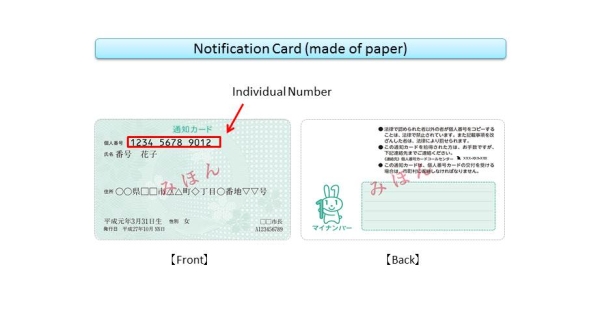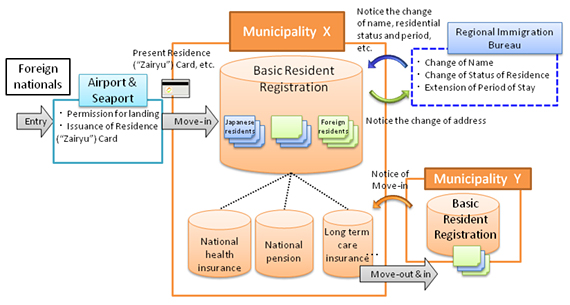You will need an Individual Number for administrative procedures for social security, taxation and disaster response from January 2016. Foreigners registered as residents in Japan will also receive their Individual Numbers from October 2015 onward. After receiving an application form with a notification card, you can apply for an Individual Number Card (IC card) by returning the application form by post or by one of the other options available. From January 2016 onward, your Individual Number Card will be ready for issuance. *The Individual Number Cards of foreign residents shall be valid until the expiration date, etc. of their period of stay (with the exception of those residing in Japan under the following statuses: Highly Skilled Professional(ii), Permanent Resident and Special Permanent Resident). Therefore, if you are in the process of applying to extend your period of stay, etc., or if you expect that your period of stay will expire prior to the scheduled issuance of your Individual Number Card, then please apply for your Individual Number Card after the extension to your period of stay has been approved. Please carefully handle your Individual Number, as it is valid throughout your entire lifetime.
Click here for details of the Social Security and Tax Number System.

Each year sees more and more foreign nationals entering and living in Japan. This has increased the need for a system where the municipalities can provide the same basic administrative services to foreign residents as they do to Japanese nationals.
Therefore, in order for foreign residents to be included in the Basic Resident Registration Act in the same way as Japanese nationals, and to rationalize the administration of municipalities and make life more convenient for foreign residents, the Law for Partial Amendments to the Basic Resident Registration Act was enacted at the 171st Diet session, and promulgated on July 15, 2009, came into effect on July 9, 2012.
With this law in effect, Resident Records have been created for foreign residents, and the Basic Resident Registration Network System and the Basic Resident Registration Card also started use from July 8, 2013.
In the Basic Resident Registration system, foreign residents must now also submit a move out notification to their old municipality and a move in notification to their new municipality when they move into a different municipality.
Note that a move out notification will also be required when moving overseas.
The following foreign nationals legally residing in Japan for more than three months (Tourists and persons who stay in Japan with a status of residence of "temporary visitor" are exempted)will be listed on the Basic Resident Registration. The person, however, must have established and maintain a residence in the municipality where the registration takes place.
|
(1) Medium to Long-Term Resident |
Foreign nationals granted a status of residence, excluding persons granted permission to stay for not more than three months or persons granted such statuses of residence as Temporary Visitor, Diplomat, or Official. A Residence ("Zairyu") Card shall be issued to those foreign nationals at the time they are permitted to land or reside in Japan in accordance with the amendment to the Immigration Control Act. |
|---|---|
|
(2) Special Permanent Resident |
Persons recognized as Special Permanent Residents stipulated by the Special Act on Immigration Control. A Special Permanent Resident Certificate shall be issued in accordance with the revised Special Act on Immigration Control. |
|
(3) Persons granted permission for temporary refuge or provisional stay |
Foreign nationals embarked on a vessel, etc. who fall under the provisions of the Refugee Recognition Act regarding the status of refugee and are granted landing permission for temporary refuge, or undocumented foreign residents who are granted permission for provisional stay upon application of refugee status. When such permissions are granted, a certificate of permission for temporary refuge or a certificate of permission for provisional stay will be issued respectively. |
|
(4) Persons who may continue to stay transitionally in Japan by birth or those who have lost Japanese nationality |
Foreign nationals who are to stay in Japan through birth or who have renounced Japanese nationality. The Immigration Control and Refugee Recognition Act stipulates that such persons may continue to stay in Japan without acquiring a status of residence for a period not exceeding sixty days. |

Besides the change of address, the Alien Registration Act also required foreign residents to notice any other changes in personal information (name, status of residence, period of stay) to the municipality where they reside. Since those changes are made at the Regional Immigration Bureaus, foreign residents were required to go to the Regional Immigration Bureau first and then to their municipality to submit the notice.
However, after the amendment becomes effective, when a foreign resident makes such changes at the Regional Immigration Bureau, those changes are reflected in the Basic Residence Registration. Foreign residents no longer have to go to their municipality. Instead, the Ministry of Justice notices such changes to the municipality and the municipality updates their records. This new system prevents the overlapped notices of the foreign residents concerned and at the same time keeps the registered information accurate.
The revised Immigration Control Act requires foreign nationals to inform the Minister of Justice of their addresses via the mayor of their municipality. This procedure is considered to be completed by submitting the move in/change of address notifications. The municipality then notifies the Ministry of Justice of the new residential information obtained through these move in/change of address notifications.
This is where to contact for questions about the Basic Resident Registration
For procedures related to foreign nationals entering or residing in Japan:
Immigration Bureau of Japan website![]()